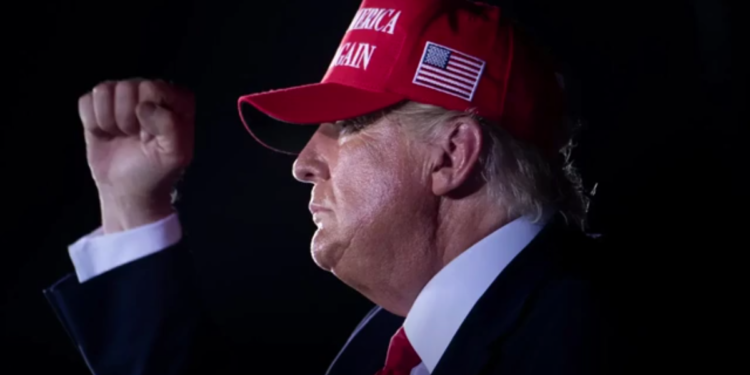In a stunning turn of events, Donald Trump has proclaimed victory in the recent United States presidential election, captivating a crowd of jubilant supporters in Florida. This declaration is not just a pivotal moment in American politics but also carries implications that resonate globally, including across the African continent.
Trump, addressing his enthusiastic audience, stated, “America has given us an unprecedented and powerful mandate.” His words ignited cheers and applause, a testament to his enduring support base. The scene was vibrant, with supporters waving flags and chanting his name, reminiscent of the passionate political rallies seen in various countries, including those in Africa where leaders often rally their bases in similar fashion.
In a significant development, Trump successfully secured crucial battleground states such as Pennsylvania, North Carolina, and Georgia. These victories have left his opponent, Kamala Harris, with a narrow and challenging path to claim victory. The stakes were undeniably high, and the competition fierce, highlighting the intense political climate that characterizes both American and many African electoral processes.
Just prior to Trump’s speech, Fox News announced that he had won the election, a projection that shifted the narrative dramatically. Other major US networks were slower to confirm this outcome, but the momentum was already building, reminiscent of how media coverage can shape perceptions of electoral outcomes in various countries, including those in Africa where media influence is profound.
For Trump, a return to the White House represents an extraordinary comeback after his defeat by Joe Biden in 2020. Many had speculated that his political career was over, yet his ability to galvanize a dedicated base and appeal to a wide range of voters has proven to be a formidable force. This resilience is a narrative familiar in African politics, where leaders often experience political comebacks after periods of adversity.
Conversely, Kamala Harris, who had positioned herself as a candidate of progress and change, opted not to address her supporters on this day of disappointment. Many of her backers had left her watch party visibly disheartened, reflecting the contrasting emotions between the two political factions. This scenario mirrors electoral outcomes in African nations, where the reactions of supporters can range from jubilation to despair in the wake of election results.
In a broader political context, Republicans are projected to have regained control of the Senate. This shift could significantly impact the legislative agenda in the United States, similar to how changes in parliamentary control can affect governance in African nations. The implications of such political dynamics extend beyond borders, influencing international relations and economic partnerships.
The 2024 election cycle has been marked by intense campaigning and heightened voter engagement. Millions of Americans participated in the electoral process, reflecting a diverse array of perspectives and priorities. Issues such as the economy, healthcare, and social justice have dominated discussions, paralleling themes that resonate in many African political debates, where voters often prioritize similar concerns.
As Trump celebrated his victory, he emphasized themes of patriotism and American strength, which struck a chord with his supporters. His rallying cry to “make America great again” has become emblematic of his political brand and resonates with many who seek national pride and economic opportunity. This narrative of national rejuvenation is not unfamiliar in Africa, where various leaders have similarly inspired their followers with visions of progress and development.
In contrast, Harris’s campaign focused on inclusivity and addressing systemic inequalities, a message that aims to resonate with marginalized communities. However, the election results indicate that her vision may not have reached as many voters as anticipated, a reality that many political analysts in Africa recognize as a common challenge in mobilizing support across diverse demographics.
The global community, including African nations, is closely monitoring the developments in the United States. The outcome of this election could have significant implications for international relations, especially as issues of trade, security, and climate change become increasingly pressing on the global agenda. The leadership of the United States will play a crucial role in shaping responses to these challenges, influencing policies that affect countries worldwide.
Following the election, discussions surrounding voter engagement and turnout are expected to dominate the discourse. Analysts will delve into the demographics of the electorate, the motivations behind their choices, and potential shifts in political alignment. Understanding these trends is vital for political parties, not only in the United States but also in African nations, as they prepare for future elections and strategize on connecting with voters.
As the political landscape evolves, the focus will inevitably shift to the transition period and its implications for the American public. Many are eager to see how Trump will navigate the challenges ahead, particularly in a politically divided environment. The potential for bipartisan cooperation, or the lack thereof, will be a key factor in determining the success of his administration.
Donald Trump’s declaration of victory marks a significant moment in American political history that resonates broadly, including in Africa. With a strong mandate from his supporters, he embarks on a new chapter that many thought he might not reclaim. As the world observes closely, the unfolding narrative promises to be as contentious and transformative as the election itself, with implications that will extend well beyond the shores of the United States. The journey ahead will be closely watched, as it holds lessons and reflections for political dynamics both in the US and across the African continent.











